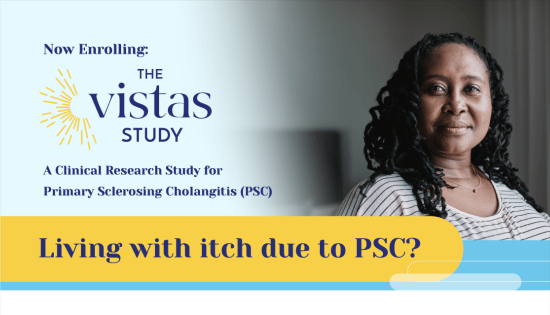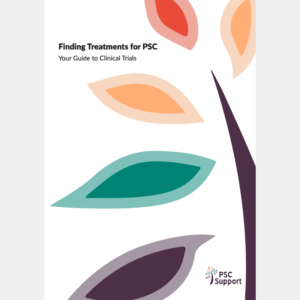VISTAS Trial
Evaluating the Safety and Efficacy of Volixibat in Patients with Itching Caused by Primary Sclerosing Cholangitis
Updated 8 Sep 2025 - Recruitment closed
The VISTAS Study is seeking patients diagnosed with PSC to evaluate whether the investigational drug volixibat is a safe and effective treatment option for cholestatic itch.
Update 17 June 2024
Based on a planned early look into the safety and efficacy data for volixibat in PSC, an independent data review committee has recommended that VISTAS continues to the final stage of the study at a specified dose (20mg). This is positive news, and means that no concerns were identified around safety and suggests that there is confidence that volixibat is helping with PSC itch.
About Volixibat
Volixibat is an investigational medicinal product that is designed to block the main transporter protein (ileal bile acid transporter [IBAT]) that is normally responsible for bringing bile acids back into the body from the gut.
As a result, volixibat treatment is expected to lower bile acid levels in the blood which in turn may help ease itch experienced by people with PSC.
FAQs
| Trial Name |
A Study to Evaluate Efficacy and Safety of an Investigational Drug Named Volixibat in Patients With Itching Caused by Primary Sclerosing Cholangitis (VISTAS) |
| ClinicalTrials.gov Identifier | NCT04663308 |
| Phase | Phase 2 |
| Intervention | Volixibat (or placebo) oral capsules twice daily |
| Recruiting now? | No. Fully recruited. |
| Liver disease diagnosis | Confirmed diagnosis of large duct or small duct PSC based on clinical guidelines |
| Age | 18 years and older 18 years and above (16 years and older at selected sites) |
| Females: can I be pregnant? | No, you must use a reliable form of birth control while taking part of this study and breastfeeding is also not allowed. |
| Is IBD (inflammatory bowel disease) allowed? | Yes, IBD is allowed if meeting additional criteria |
| Is PSC with AIH (autoimmune hepatitis) allowed? | Yes, PSC with or without AIH is allowed if meeting additional criteria |
| Is there an ALP (alkaline phosphatase) requirement? | No |
| Is there an itch requirement? | Yes, patients must have itch due to PSC to take part |
| Can I take UDCA (Urso)? | Yes, UDCA use will be allowed if meeting additional criteria |
| Can I take part if I have a stent? | Yes, if the bile duct stent was placed more than 12 weeks prior to Day 1 |
| Are recent acute cholangitis attacks allowed? | Acute cholangitis attacks are not exclusionary. Please contact the study team for more details. |
| Can I take part if I have had a liver transplant? | No |
| Is cirrhosis allowed? | Yes, if there is no evidence or clinical suspicion of decompensated cirrhosis, or a history of decompensation events |
| Previous studies and information (from Sponsor website) | Links to published research about this drug:
Phase 1 Drug-Interaction Loperamide Study
Interim result announcement for VISTAS (17 June 2024)
Interim result announcement (slide deck) for VANTAGE (PBC Study) (17 June 2024) |
| Are travel expenses covered? | Travel expenses will be reimbursed. Please check with the study staff for additional information. It will not cost you to participate in the study. |
| Procedures and tests include: | Daily 1-minute questionnaire in a mobile phone device, and additional questionnaires at in person visits on an on-site tablet device. Blood tests, and liver transient elastography (Fibroscan).
No biopsy is required. |
| How many study visits? How long will each study visit be? | The blinded study period will be 10 planned study visits over 32 weeks. Some visits can be remote televisits or virtual visits, at the discretion of the investigator. The duration for each on-site visit is approximately 4-6 hours. |
| Duration of Study (treatment duration/follow-up) | Study participation will last 7~8 months with the option to continue in the long-term extension phase, where eligible participants will receive the investigational medication for an indefinite amount of time. |
| Basic design of study | Randomised double-blind placebo-controlled study. |
| How is this intervention thought to work and what is it thought to do? | Volixibat is designed to block the main transporter protein (IBAT) that is normally responsible for bringing bile acids back into the body from the gut. As a result, volixibat treatment is expected to lower bile acid levels in the blood which in turn may help ease itch experienced by people with PSC. |
| Study website | Vistas PSC Study |
| Sponsor website | Mirum Pharmaceuticals, Inc |


